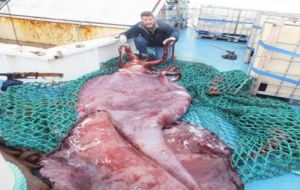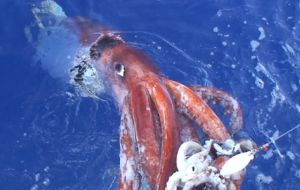MercoPress. South Atlantic News Agency
NZ scientists examine giant squid caught in Antarctica' Ross Sea
 The squid is a female, and its eight arms are each well over a meter long. Its two tentacles would have been perhaps double that length if not damaged.
The squid is a female, and its eight arms are each well over a meter long. Its two tentacles would have been perhaps double that length if not damaged.  Colossal squid sometimes inhabit the world of fiction and imagination, but have rarely been seen in daylight.
Colossal squid sometimes inhabit the world of fiction and imagination, but have rarely been seen in daylight. It was a calm morning in Antarctica's remote Ross Sea, during the season when the sun never sets, when Capt. John Bennett and his crew hauled up a creature with tentacles like fire hoses and eyes like dinner plates from a mile below the surface. A colossal squid: 350 kilograms, as long as a minibus and one of the sea’s most elusive species.
It had been frozen for eight months until Monday, when scientists in New Zealand got a long-anticipated chance to thaw out the animal and inspect it, once they used a forklift to maneuver it into a tank.
The squid is a female, and its eight arms are each well over a meter long. Its two tentacles would have been perhaps double that length if they had not been damaged.
Kat Bolstad, a squid scientist from the Auckland University of Technology who was leading a team examining the creature, described it as “very big, very beautiful.”
“This is essentially an intact specimen, which is almost an unparalleled opportunity for us to examine,” she said. “This is a spectacular opportunity.”
Many people around the world agreed: About 142,000 people from 180 countries watched streaming footage of the squid examination on the Internet
Colossal squid sometimes inhabit the world of fiction and imagination, but have rarely been seen in daylight.
Remarkably, Capt Bennett and his crew on the San Aspiring toothfish boat have caught two giant squid. Their first, hauled in seven years ago, is on display in New Zealand’s national museum, Te Papa.
Capt Bennett said there was so much excitement about his previous catch, he thought he had better save the latest one for research.
“It was partly alive, it was still hanging onto the fish,” Capt Bennett recalls. “Just a big bulk in the water. They’re huge, and the mantle’s all filled with water. It’s quite an awesome sight.”
Susan Waugh, a senior curator at Te Papa, said scientists hope to find out more about where the creature fits in the food chain, how much genetic variation there is among different squid types, and basic facts about how the colossal squid lives and dies.
She said scientists plan to further assess the condition of the squid before determining whether to preserve it for public display.
Bolstad said it’s possible that ancient sightings of the species gave rise to tales of the kraken, or giant sea-monster squid. She said sperm whales often eat colossal squid and are known to play with their food, and sailors may have mistaken that for epic battles.
“On the other hand, we don’t really know what the grog rations were like at that time at sea, either,” she said. So it may be that we’ve got a bit of a fisherman’s story going on there, too".




Top Comments
Disclaimer & comment rules-

-

Read all commentsNo, no, no, it is not the extremely erratic and stupid Argentine economics policy - it's somebody else's fault and a concerted attack on one of the most ... what am I saying!?! on The Most Important Country In The World.
Sep 18th, 2014 - 02:59 pm 0Signed by me, Kicillof .... er, can I have anosser bosle of whisky, pleache?
This is the main reason aliens wont come here,
Sep 18th, 2014 - 06:34 pm 0upon being caught they would end up like this poor fellow cut spliced and diced,
this is not on.
Commenting for this story is now closed.
If you have a Facebook account, become a fan and comment on our Facebook Page!